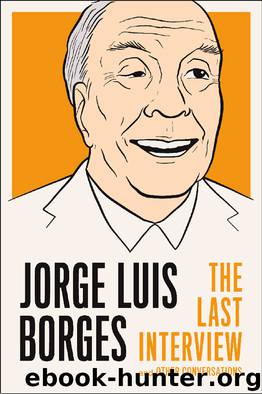Jorge Luis Borges by Jorge Luis Borges

Author:Jorge Luis Borges [Borges, Jorge Luis]
Language: eng
Format: epub
ISBN: 978-1-61219-205-5
Publisher: Melville House
Published: 2013-06-25T04:00:00+00:00
At the hour of anguish and vague light,
He would rest his eyes on his Golem.
Who can tell us what God felt,
As He gazed on His rabbi in Prague?
I think that’s one of my best poems. And then another poem I like that’s quite obvious is “Límites.” But I think I can give you the reason. The reason is, I suppose, that it’s quite easy to write an original poem, let’s say, with original thoughts or surprising thoughts. I mean, if you think, that’s what the metaphysical poets did in England, no? But in the case of “Límites,” I have had the great luck to write a poem about something that everybody has felt, or may feel. For example, what I am feeling today in Cambridge—I am going tomorrow to New York and won’t be back until Wednesday or Thursday and I feel that I am doing things for the last time.
And yet, I mean that most common feelings, most human feelings, have found their way into poetry and been worked over and over again, as they should have been, for the last thousand years. But here I’ve been very lucky, because having a long literary past, I mean, having read in many literatures, I seem to have found a subject that is fairly new and yet a subject that is not thought to be extravagant. Because when I say, especially at a certain age, that we are doing things for the last time and may not be aware of it—for all I know I may be looking out of this window for the last time, or there are books that I shall never read, books that I have already read for the last time—I think that I have opened, let’s say, the door to a feeling that all men have. And then, of course, other poets will do far better than I do, but this will be one of the first poems on the subject. So I’m almost as lucky as if I were the first man to write a poem about the joy of spring, or the sadness of the fall or autumn.
BURGIN: And yet it’s the same idea as that parable of yours, “The Witness,” where you talk about the infinite number of things that die to the universe with the death of each man.
BORGES: About that Saxon?
BURGIN: Yes. It’s the same kind of idea. Which did you write first?
BORGES: No, I think I wrote that parable, that story of the Saxon, first.
BURGIN: So that was really the first time you wrote out the idea.
BORGES: No, the first time I wrote it I attributed it to a bogus Uruguayan poet, Julio Hacolo—you’ll find it at the end of the Obra poética. That was a rough draft.
BURGIN: Oh, and that preceded the parable and the long poem.
BORGES: Yes. Somehow I knew that I had found something quite good, but at the same time I didn’t think anything could be made of it. So I thought, “I’ll jot this down,
Download
This site does not store any files on its server. We only index and link to content provided by other sites. Please contact the content providers to delete copyright contents if any and email us, we'll remove relevant links or contents immediately.
| Anthologies | Short Stories |
The Tidewater Tales by John Barth(12659)
Kathy Andrews Collection by Kathy Andrews(11831)
Tell Tale: Stories by Jeffrey Archer(9037)
This Is How You Lose Her by Junot Diaz(6887)
The Mistress Wife by Lynne Graham(6490)
The Last Wish (The Witcher Book 1) by Andrzej Sapkowski(5467)
Dancing After Hours by Andre Dubus(5280)
The Sympathizer by Viet Thanh Nguyen(4390)
Be in a Treehouse by Pete Nelson(4051)
The Secret Wife by Lynne Graham(3925)
Maps In A Mirror by Orson Scott Card(3901)
Tangled by Emma Chase(3760)
Ficciones by Jorge Luis Borges(3635)
The House on Mango Street by Sandra Cisneros(3472)
A Knight of the Seven Kingdoms by George R R Martin(3371)
Girls Who Bite by Delilah Devlin(3256)
You Lost Him at Hello by Jess McCann(3073)
MatchUp by Lee Child(2883)
Once Upon a Wedding by Kait Nolan(2794)
